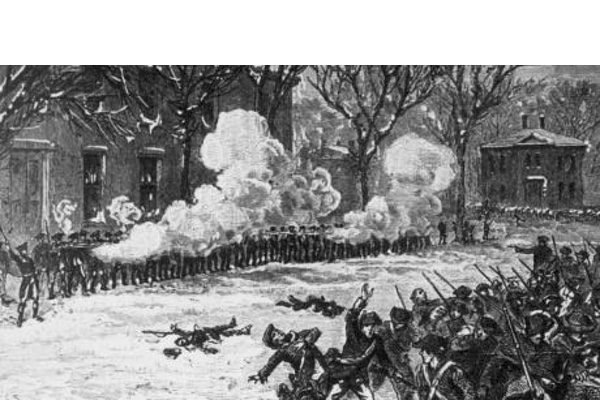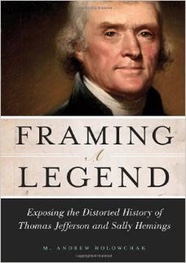Did Jefferson Really Mean It When He Said Liberty Now and Then Requires the Shedding of Blood?

Soldiers open fire on rebels during the Shays' rebellion
To William Stevens Smith (13 Nov. 1787), Jefferson uses the metaphor of the tree of liberty in what has become a famous (or infamous) passage concerning Shays’s Rebellion.
Yet where does this anarchy exist? Where did it ever exist, except in the single instance of Massachusets? And can history produce an instance of a rebellion so honourably conducted? I say nothing of it’s motives. They were founded in ignorance, not wickedness. God forbid we should ever be 20. years without such a rebellion. The people can not be all, and always, well informed. The part which is wrong will be discontented in proportion to the importance of the facts they misconceive. If they remain quiet under such misconceptions it is a lethargy, the forerunner of death to the public liberty. We have had 13. states independant 11. years. There has been one rebellion. That comes to one rebellion in a century and a half for each state. What country ever existed a century and a half without a rebellion? And what country can preserve it’s liberties if their rulers are not warned from time to time that their people preserve the spirit of resistance? Let them take arms. The remedy is to set them right as to facts, pardon and pacify them. What signify a few lives lost in a century or two? The tree of liberty must be refreshed from time to time with the blood of patriots and tyrants. It is it’s natural manure.
 This oft-referred-to passage, an
apologia for the actions of farmers and other dissenters in
Massachusetts (the rebellion began in 1786 and
continued in pulses till June of 1787), has perplexed scholars
for decades, because the general reaction of others in Jefferson’s
day (e.g., Henry Knox and George Washington) was alarm or even panic.
Why was not Jefferson alarmed or panicked? What became apparent to
many was that the Articles of Confederation disallowed a strong
central government, impotent in such a crisis. Moreover, the
rebellion illustrated the fragility and tenuousness of the union.
Consequently, Jefferson’s response in the letter is not just
atypical, but also customarily interpreted as evidence of a
sanguinary streak in him.
This oft-referred-to passage, an
apologia for the actions of farmers and other dissenters in
Massachusetts (the rebellion began in 1786 and
continued in pulses till June of 1787), has perplexed scholars
for decades, because the general reaction of others in Jefferson’s
day (e.g., Henry Knox and George Washington) was alarm or even panic.
Why was not Jefferson alarmed or panicked? What became apparent to
many was that the Articles of Confederation disallowed a strong
central government, impotent in such a crisis. Moreover, the
rebellion illustrated the fragility and tenuousness of the union.
Consequently, Jefferson’s response in the letter is not just
atypical, but also customarily interpreted as evidence of a
sanguinary streak in him.
The letter, many scholars assert, is just one more instance of Jefferson’s hypocrisy. Conor Cruise O’Brien develops a radical thesis around it and a few similar letters in The Long Affair. The letter to Smith is an attempt to rationalize the violence of Shay’s Rebellion. Jefferson, he thinks, would have been at ease with “the most militant segment of the modern American militias.” Peter Onuf in The Mind of Thomas Jefferson mentions Jefferson’s avowed cowardice apropos of Benedict Arnold’s invasion of Virginia. He refers to the tree of liberty statement in the letter to Smith to show Jefferson, “himself no hero,” was “eager enough that others should die.” He sums, “Here, for skeptical military men, were the classic symptoms of civilian bloodthirstiness, justifying itself by appeal to the most exalted ideological principles.” Gordon Wood in Empire of Liberty notes that Jefferson was a radical revolutionist, at least in his early political career. He quotes from a British guest at a dinner partner with Jefferson, “[Jefferson] cannot live but in a revolution, and all events in Europe are only considered by him in the relation they bear to the probability of a revolution to be produced by them.” C. Vann Woodward in The Future of the Past, sees nothing astonishing in the letter. “This comes as no surprise from the author of the Declaration of Independence.” He adds that Jefferson, regarded as “Mr. Revolution” in France, was construed to be the “leading world authority on the subject.”
Other scholars urge caution concerning taking the metaphors too straightforwardly.Dumas Malone says Jefferson was “far more aware than most of [his contemporaries] of the everlasting dangers of tyranny and force. Rebellion—occasional rebellion—on the part of men nurtured in self-government seemed to him much the lesser evil.” Alf Mapp writes in Thomas Jefferson: America’s Paradoxical Patriot, “So great is the volume of Jefferson’s correspondence that even a tiny proportion of it written with unguarded hyperbole affords numerous quotations for the use of those who portray him as an extremist.”
In agreement with Malone and Mapp, there is nothing remarkable in the letter, if we understand how Jefferson thought of rebellions. First, rebellions, for Jefferson, are not revolutions. They are more prophylactic than substantive in that their aim is preservation or alteration, not wholesale change. Second, Jefferson notes that rebellions have been common occurrences in most countries over the centuries. Given that, the worries about Shays’s Rebellion are de trop. Third, Jefferson acknowledges that even the best intended governors, if governing long, will tend to govern in their own interests and not in the interests of the citizenry. “Every government degenerates when trusted to the rulers of the people alone,” he writes in Query XIV of his Notes on Virginia. Thus, rebellion from time to time will serve as a warning to those empowered with the rule of a state that they are not to abuse those powers. So, a few lives lost in the effort to preserve citizens’ rights and liberties is small beer when compared to the inevitable result of lethargy: the evanescence of coercive government and its corrosive, liberty-burking effects—evident by the study of history.
Jefferson’s argument, hyperboles and metaphors aside, is much the same as John Stuart Mill’s in On Liberty, when Mill writes of the birth, maturation, and decline of ethical doctrines or religious creeds. “Their meaning continues to be felt in undiminished strength, and is perhaps brought out into even fuller consciousness, so long as the struggle lasts to give the doctrine or creed an ascendency over other creeds.” Thus, doctrines or creeds flourish when there are diversity of opinion, freedom of debate, and toleration of diversity for human flourishing—viz., when adherents are allowed to, and do, fight on their behalf. It is much the same with Jefferson. That is why he considers sanguinary rebellions from time to time to be the manure that keeps healthy the tree of liberty.
Were Jefferson alive today, he would certainly be taken aback by the ever growing urbanity as well as the wearisome uniformity of that urbanity due to corporate monopolies (e.g., Exxon Mobile, Walmart, Apple, and CVS) in America. Moreover, though he would doubtless embrace the advance of technologies for enhanced spread of information and communication (email, cell phones, and the Internet) as he did the printing press, he would pooh-pooh, as he did non-substantive novels, the insipid uses to which such technologies are being put (empty text messages and unimportant phone calls, as well as overuse of the Internet for trivial concerns)—all evidence of apathy and faineance of the general citizenry, each focused merely on advancing his own affairs. No better evidence of that is in Query XVII of Notes on Virginia, in which Jefferson prophesies that the American citizenry, upon cessation of the revolutionary war, “will forget themselves, but in the sole faculty of making money, and will never think of uniting to effect a due respect for their rights.”
Yet thus far we have eschewed what perhaps is most remarkable in the letter to Smith: the sentiment that Jefferson seems to be enjoining rebellion, even when the people are confused about the facts. “The people can not be all, and always, well informed. The part which is wrong will be discontented in proportion to the importance of the facts they misconceive.” Yet these significant claims cannot be taken as evidence that Jefferson countenances rebellious actions in cases of complete or abundant ignorance. Recall Shays’s Rebellion was mostly of farmers, disgruntled by economic difficulties in Massachusetts and the dire governmental actions to solve them, though there were other concerns. There were good reasons for rebellion of some sort, even if the rebels were not informed of all the facts. Motives—“they were founded in ignorance, not wickedness”—must be considered before punishment is harefootedly doled out.
Still, Jefferson puzzlingly adds, “If they [the people] remain quiet under such misconceptions it is a lethargy, the forerunner of death to the public liberty.” Again, there is no reason to see “misconceptions” to imply complete or abundant ignorance, but merely partial ignorance, and it is critical to underscore Jefferson’s conception of lethargy as “the forerunner of death to the public liberty.” Jefferson as early as 1776 (Resolution for Rotation of Members of Continental Congress) recognized that it was necessary “to prevent every danger which might arise to American freedom by continuing too long in office the members of the Continental Congress.” He also recognized the “selfish interests of kings, nobles and priests” over the centuries (TJ to Ellen Randolph Coolidge, 17 Aug. 1825). Thus, a government of the people has also to be by the people. It follows that “the influence over government must be shared among all the people” (Query XIV) and that the people have a right to act when their interests are being neglected or abused. That is why Jefferson in his letter to Smith advocates pardoning and pacifying the people when they rebel. The people “preserve the spirit of resistance,” and that spirit of resistance in turn preserves their rights and liberties. Governors cannot be trusted.
Yet Jefferson did not always appeal to hyperbole or rebellion to make his point apropos of acting on behalf of preserving liberty. He recognized that once a constitution was in place, there would be a limited role for rebellion. He says to C.W.F. Dumas (10 Sept. 1787), “Happy for us, that when we find our constitutions defective and insufficient to secure the happiness of our people, we can assemble with all the coolness of philosophers and set it to rights, while every other nation on earth must have recourse to arms to amend or to restore their constitutions.”